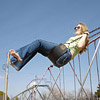Session Overview

|
What happens to our bodies as we grow older? How do our brains change as we age? In this section, we will discuss the cognitive, emotional, and physical changes that occur as we progress into adulthood and beyond, showing through experimental studies what changes occur as we age. Keywords: adolescence, gerontology, risk, hippocampus Photo courtesy of colorblindPICASO on Flickr. CC-BY-NC. |
Session Activities
Readings
Read the following before watching the lecture video.
- Finish the chapter you started for the previous session:
Lecture Videos
View Full Video
View by Chapter
- Stages of Development
- Neurogenesis
- Brain Development: Cell Migration, Synaptic Formation, and Myelination
- Good Memories of Bad Events in Infancy
- How Development is Studied
- Cognitive Loss
- Attitudes, Emotions, and Aging
- Dopamine and Reward Systems
- The Creation of (False) Memories
- Risk Assessment and Loss Aversion
Video Resources
Discussion: Development
Adulthood and aging, including changes in the body, in perception, and in cognition; and social and emotional development across the lifespan… Read more »
Further Study
These optional resources are provided for students that wish to explore this topic more fully.
| TYPE | CONTENT | CONTEXT |
|---|---|---|
| Video | “The Aging Brain,” from Charlie Rose: The Brain Series with Scott Small, Larry Squire, Brenda Milner, Eric Kandel, and John Hardy. | A panel discussion of aging in the brain hosted by Eric Kandel and the Howard Hughes Medical Institute |
| Website (with video) | “The Teenage Brain” from Frontline. | A Frontline episode about the teenage brain, as well as text explanations, interviews, and viewer comments |
| Textbook supplement | Study materials for Chapter 12, “Psychology of the Lifespan: Growing Up, Growing Older, Growing Wiser,” in Study Site for Psychology in Context, 3/e (Pearson Education, 2007) | Practice test questions, flashcards, and media for a related textbook by Kosslyn & Rosenberg |








